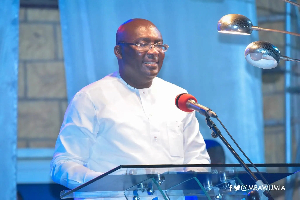Where did it go?
Fritz A. Gockel, a Senior Lecturer at the Institute of Statistical, Social and Economic Research (ISSER) has referred to Ghana’s inability to access an additional facility from the international capital markets as a result of the financial crisis as a blessing in disguise, saying that, it has prohibited indiscriminate borrowing.
Speaking to members of the Institute of Financial and Economic Journalist (IFEJ) in Accra ahead of the World Bank Spring meetings, Dr Gockel bemoaned the fact that proceeds from the recent sovereign bonds were not utilized for projects that could generate enough funds for its servicing.
According to him, a serious plan ought to have been put in place aimed at ensuring that the proceeds from the Eurobonds were used on projects that could generate enough revenue within the shortest possible time to ensure its servicing does not cripple us.
“The fact that we were credit-worthy did not mean we should borrow”, he quipped; adding that spending a chunk of the facility on recurrent expenditure had dire consequences on the country.
Whilst it has not been clearly established which specific projects were undertaken with proceeds from the Eurobond, a number of economic analysts this paper talked to expressed similar concerns about the use of the facility which has already gulped its first $63 million in interest payment.
In his November 2006 presentation of the 2007 budget, the late Finance Minister, Mr Kwadwo Baah-Wiredu dropped the hint on government’s decision to hit the international capital markets in search of additional resources of about $1.8 billion over a four year period between 2007 and 2010 to support the Growth and Poverty Reduction Strategy II (GPRS II) programme.
Following a successful offer, the elated minister gave a strong indication that proceeds from the Eurobond would be used in projects that would pay back in time, including the construction of major highways on which tolls will be collected towards repayment of the facility.
The Accra - Kumasi dual carriage highway, portions of which were already under construction with support from multilateral and bilateral sources, was cited as one of such projects, but work on the highway has remained behind schedule. A toll booth has recently been erected on the Ofankor – Nsawam section of the highway, but the fee of five Ghana Pesewas charged at the booth clearly needs an upward review if sufficient funds can be obtained from this road corridor.
The Minister of Finance, Dr. Kwabena Duffuor in the past month announced government’s decision to create a special fund in which it will save to pay interest on the Eurobond and the $750 million principal which is due for repayment in 2017, but experts believe the country’s finances could seriously be affected by repayment for the non-concessional commercial loan.
Ghana made history as the first post-HIPC debt relief country to access the international capital markets, riding on the back of a favourable credit rating of B+ assigned by the global rating agency, Fitch.
The offer which had Citi and UBS Global Asset management as lead managers was heavily oversubscribed with a book size of almost $3 billion. About 40% was placed to U.S. investors, 36% with UK investors and the rest in Europe. About 158 accounts bought into the deal that promised investors 8.5 percent yield per annum.
The Eurobond has since received several acclamations including the International Financing Review (IFR)’s Review of the year award, as Emerging Market Bond of the Year 2007.
The capital markets have ever since dried up as a result of the global economic crises, stifling any further attempts by government to access an additional facility, with many other African countries such as Kenya, Tanzania, and Nigeria shelving plans of borrowing from the international markets until investor appetite is revived.
Ghana on its part postponed plans for a $300 million bond last September due to poor global market conditions. The bond was intended to clear debts the state assumed from Ghana Telecom after privatisation.
Adding up to the woes of these African countries, ratings agency Standard & Poor's (S&P) last Wednesday said there may be more downgrades of African ratings this year due to the recession, adding that policy response to the crisis was key to Africa's ratings.
According to the agency, seven out of the 19 African sovereigns rated by S&P are on negative outlook, with Ghana on the list with Madagascar, Nigeria, Senegal, South Africa, Botswana and Seychelles.
Meanwhile, South Africa’s finance minister, Trevor Manuel remains optimistic on their plan to borrow from the international markets soon.
Prior to securing the offer, the IMF was said to have disagreed with Ghana’s decision on concerns of the issue of debt sustainability. In their view, unsustainable external commercial borrowing at unconcessional rates could jeopardise the country’s external debt position, particularly, after the country had just benefited from debt relief as part of a $40 billion debt relief package for Highly Indebted Poor Countries (HIPC) in 2005. Rumors are rife now about government’s intention to return to the IMF for a loan to forestall a continuing depreciation in the local cedi.
Business News of Tuesday, 5 May 2009
Source: Financial Intelligence
















